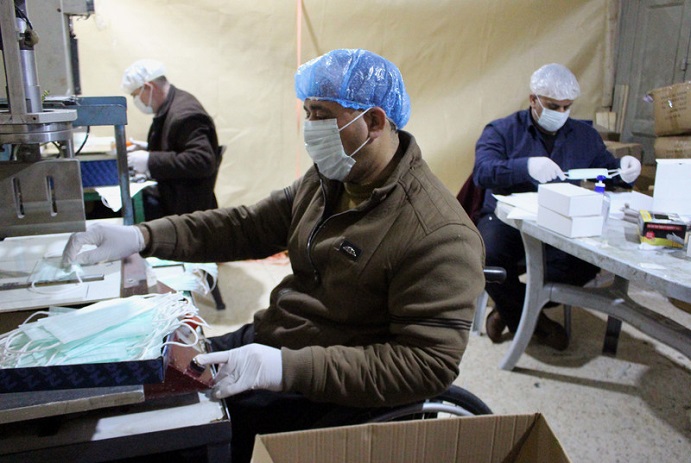
The Electronic Intifada / March 14, 2020
The number of confirmed cases of COVID-19 – the disease caused by a new coronavirus that has caused a global pandemic – continues to rise in Israel and the occupied West Bank.
Israel reported 193 confirmed cases on Saturday, while the Palestinian Authority said it had confirmed 38 cases in the West Bank – all in the Bethlehem area except for one case in Tulkarm.
The number of actual cases is likely much higher, as those figures only represent cases of patients who have been tested.
While no cases have yet been confirmed in Gaza, 1,400 people in the besieged territory are reported to be in self-isolation at home.
Authorities in Gaza have restricted travel from Gaza to urgent humanitarian cases. Travelers entering Gaza via Egypt or Israel are required to enter quarantine at their homes or a quarantine center established in Rafah.
Schools in both the West Bank and Gaza are closed until the end of March.
The World Health Organization says the risk of a COVID-19 outbreak in the West Bank and Gaza Strip is very high.
The epicenter of the disease has moved from East Asia to Europe as the number of confirmed cases outside China has increased 13-fold.
More than 142,000 cases – nearly 5,400 fatal – have been confirmed worldwide.
On Saturday, Spain and France announced measures amounting to a near-total lockdown, with the closure of nonessential businesses including bars and restaurants.
Despite similar measures in Italy over the last few weeks, that country saw its biggest jump of cases on Saturday.
There are 14,000 confirmed cases of the new coronavirus in the Middle East and North Africa, causing 627 deaths, the vast majority in Iran.
Sweeping measures
Israel and the Palestinian Authority in the West Bank have taken sweeping measures to contain the virus.
Israel has shut down air travel in and out of the country, and the Allenby Bridge crossing between the West Bank and Jordan, which Israel operates on the West Bank side, has been closed since early this week.
Both Israel and the Palestinian Authority have closed schools and ordered the closure of gathering places such as cafes and restaurants, and restricted indoor gatherings.
The Palestinian Authority has suspended worship at mosques and churches but the al-Aqsa mosque compound in Jerusalem remains open.
Israel has reduced the number of Palestinian labourers it allows in from the West Bank, banning workers 50 and older.
Though Palestinians in the West Bank are generally restricted from entering Israel without an Israeli permit, the presence of 600,000 settlers in Israel’s West Bank colonies means that there is no separating those populations in the context of the coronavirus.
As the Tel Aviv daily Haaretz explains, “Palestinians and settlers share common spaces such as gas stations and supermarkets in a number of places in the West Bank, and settlers travel freely to Israel and are treated in hospitals in Israel.”
The paper added that Israel’s “defense establishment believes that due to this mutual dependence between Israelis and Palestinians in the West Bank, there would be no way to instate a full quarantine.”
Israel’s attorney general meanwhile approved the use of mobile tracking by Israeli police to enforce coronavirus quarantines.
Israel has come under criticism for its discriminatory response to the coronavirus.
An emergency committee of legislators representing the Joint List bloc, as well as community leaders and physicians, are calling on Israel to publish coronavirus prevention materials in Arabic.
The Palestinian Authority is meanwhile calling on Israel to release the approximately 6,000 Palestinians held in its prisons, especially those who are already in poor health.
Gaza fears
Fears about the potential spread of the coronavirus to Gaza are especially high, as the health system in the territory has long been on the verge of collapse.
The UN has issued repeated warnings over the state of Gaza’s health system, which has struggled to cope with 13 years of a severe Israeli blockade and successive Israeli military assaults on the territory.
For the past two years, Gaza’s hospitals have been hit with a staggering number of injuries requiring complex surgery and long-term rehabilitation resulting from Israel’s use of live fire against protesters in the territory.
As the occupying power, Israel is responsible for providing basic services like health infrastructure to the civilian population in Gaza. But it has instead diminished the capacity of Gaza’s health system.
Among the goods that Israel prohibits from entering Gaza is hydrogen peroxide, which is used as a disinfectant.
Israeli media reports have suggested that Israel may transfer coronavirus patients from Gaza to its hospitals, but government officials fear a shortage of hospital beds for Israeli patients.
Neighbouring Jordan has shut all its borders and will be stopping all passenger flights beginning Tuesday. Universities and schools in the country will be closed for two weeks, as well as tourist sites and cinemas.
Jordan has reported one case of the coronavirus – a patient who has recovered and was released from a hospital on Friday.
Syria, which has reported no cases, has announced similar measures and pushed parliamentary elections scheduled for April to late May.
UNRWA, the UN agency for Palestine refugees – which operates in Syria, Lebanon and Jordan, in addition to the West Bank and Gaza – has had to temporarily close some of its schools and suspend services as the virus spreads.
It is yet another unanticipated emergency stretching the capacity of the agency, which the Trump administration in Washington has sought to dismantle.
Christian Saunders, UNRWA’s acting commissioner-general, warned on Friday that without additional funding over the next four to six weeks, “we will have to take some hard decisions.”
“We may have to close schools. We may have to close our health centers,” he added.
Maureen Clare Murphy is an associate editor of The Electronic Intifada and lives in Chicago












